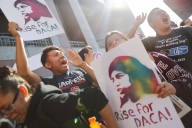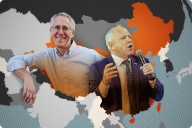You have /5 articles left.
Sign up for a free account or log in.
When his university accused him of aiding and abetting a terrorist organization, Clyde Forsberg, an American citizen teaching in Turkey, posted on Facebook that he suspected his real crime was “aiding and abetting poetry.”
He’d been recording in verse the changed reality around him as colleagues caught in the purges that have swept Turkey since a July 15 coup attempt found themselves under investigation. One of Forsberg’s poems, posted on his Facebook page July 26, ends with his own imagined inquisition. Told by an interlocutor, a colleague, that his American citizenship would protect him, that “They will not come for you hocam (teacher),” the speaker in the poem responds boldly, if brashly:
Then, let them come for me.
Let them prepare a new brown envelope with my name on it
Let them replace the lock on my office door
Let them call their kangaroo court to order
Forsberg received notice that he'd been suspended by his university a week later, on Aug. 2. He was arrested on Aug. 13, detained for four days, and dismissed from Karabük University upon his release. The dismissal notice cites his earlier suspension for “abetting and aiding, FETÖ/PYD armed terror organization,” FETÖ being the acronym for what Turkey's government has deemed the Fethullah Terrorist Organization, which it blames for the failed coup. PYD is an acronym for a Kurdish political party in Syria considered by Turkey to be a terrorist organization, though it seems plausible it is a typo meant to be PDY, another name for FETÖ.
Thousands of academics have reportedly been suspended from their positions across Turkey, and some have been detained as the government seeks to root out followers of Fethullah Gülen, the self-exiled Islamic cleric whom it believes is behind the coup attempt (Gülen has denied responsibility). The government has defended the massive purges, which have involved not just the educational sector but also the civil service, the judiciary, the media, the police, and the military, as necessary to remove a terroristic threat that has infiltrated the institutions of the state. Critics charge that the purges, which have also resulted in the closure of 15 private universities, have the appearance of a witch hunt.
The Middle East Studies Association recently wrote to U.S. Secretary of State John Kerry saying "the Turkish government’s actions against the country’s academics and universities exceed the bounds of a legitimate and targeted effort to detain and prosecute those responsible for the coup attempt."
"The assaults on academic freedom and higher education by the Turkish government are proceeding on the basis of allegations of links between the individuals and institutions targeted and the planning of the failed coup," MESA's letter states. "Those allegations do not appear to include direct involvement in the planning or execution of the attempted coup but rather suggestions of financial and other ties to the exiled cleric, Fethullah Gülen...Public reports suggest that some academics are under investigation because they took out a mortgage with a bank that is allegedly tied to Gülen or attended a school with links to the cleric’s educational network. Without more evidence of a direct relationship between the attempted coup and the affected universities, academic faculty and staff, the basis for these actions amounts to little more than guilt-by-association."
Forsberg’s story is just one story of an academic detained in Turkey, and if his story is atypical it is because he is indeed a foreigner -- an American citizen, educated in Canada -- with international academic connections that helped him rapidly secure continued employment this fall at a university in Kyrgyzstan.
“I don’t want to feel sorry for myself,” said Forsberg, who studies the history of religions and American culture and is also a jazz musician and playwright. He was until about two weeks ago a professor in the Department of Western Languages and Literatures at Karabük, a public university in the north of Turkey.
“I was there [in jail] for four days and some of them will be in a much worse place for years and years."
Suspension, Detention and Dismissal
When Forsberg received written notice of the charges he faced from the university he refused to sign his name to the document, demanding an English language transition, which, he said, he never received.
“I thought, OK, I’m fired, that’s it,” Forsberg said in an interview. It wasn’t. On Saturday, Aug. 13 he traveled to Ankara to see a doctor.
“On my way back home my wife phoned to say the police were in the home, they had gone through everything, and they were waiting to arrest me,” Forsberg said. “I had about two hours before I would be taken into custody. I talked to the police, and told them I was on a bus, that I was on my way to Karabük, that I was about two hours away, and I would come home and deal with it.”
“It gave me a little time to phone the American embassy and tell them that I was going to be arrested. I’d been in contact with them for about two weeks before this because I was concerned this might happen. They weren’t being helpful, and I’m being generous when I say they weren’t being helpful. Now I was being arrested, and they still weren’t very helpful.” (Asked about Forsberg's case, a State Department official said, "We are aware of reports that a U.S. citizen was detained and subsequently released in Turkey. The Department of State takes its obligation to assist U.S. citizens abroad seriously. In cases where U.S. citizens are detained overseas, the department works to provide all appropriate consular assistance. Due to privacy considerations, we are unable to comment further.")
“They told me the police would probably take a statement," Forsberg said. "The police didn’t just take a statement; the police took me to prison. The police made a point to intercept the bus, and drag me off the bus, which was horrible, and they drove me the rest of the way to Karabük. I didn’t get to see my wife or my kinds and then they took me to the hospital where it would be determined whether I was well enough to be in jail, because I had just had an angiogram and was in the middle of a diagnosis for heart disease.”
Forsberg was taken to the jail. “What I most remember about that is when they told me to take the shoelaces out of my shoes. Also, they took my glasses and I can’t see anything without my glasses. The four days I was in a jail cell I couldn’t see.”
The police did not treat him poorly. “They were very nice, honestly,” he said. “They were jovial. It was like a boys’ locker room. There was lots of laughing. There was too much laughing for my taste. Honestly, it was a bit creepy, but it was like, this is just a bit of theater. We know you’re all innocent but we have to do this. This is Turkey.”
“It kind of lulled people into a sense of false security.”
The windows in the jail were blocked. “In my case I couldn’t see -- everything was a blur -- but I also had no sense of time, and they didn’t tell us what came next. They left us for 24 hours, just wondering, ‘what next,’ and wondering ‘what next’ was really difficult. Time just slowed down. It slowed down to a crawl. For me it was not knowing the time that was starting to drive me a bit nuts.”
“I realized, wait a minute, there’s a way for me to have a general idea of what time it is. I just listened to the [Muslim] call for prayer,” which happens five times a day. “It broke up the day and kept me sane.”
Forsberg was interrogated more than once. He said his interrogators scrolled through his phone and looked through his family pictures in front of him. They examined his emails. They asked him who was on the cover of his latest book, an image of which he’d posted on his Facebook page. (The answer was Joseph Smith, the founder of the Mormon Church, but Forsberg suspects they thought it was Mustafa Kemal Atatürk, the founder of modern Turkey as a secular state.)
His interrogators asked about his compact discs, including an album that Forsberg had recorded. “I said, ‘actually, this is my music.’ I showed them the pictures of me on the jacket and all that. They said, ‘what do you think we should do with these?’ I said, ‘you should listen to them.’”
On the last day he was detained the atmosphere in the jail had changed dramatically, he said, “from the boys’ locker room to something else. The smiles and the niceties and the politeness, that was all gone, and that was a little scary. I wasn’t too concerned for myself. I figured I’d given some good answers, I would get off, but some of the Turkish academics there, they were terrified, and they were right to be terrified.”
“They lined us up,” Forsberg continued. “I didn’t understand what they had in mind, but for the four days they called me ‘America,’ and they would say ‘America, come here.' I was at the back of the line and they said, ‘America, America you come to the front,' and I said, ‘oh good,’ I’ll be first and I’ll be done with this, and I’ll be going home. I didn’t understand anything. What they did was a perp walk.”
Forsberg was released that day after his appearance in court. But the fact of his court appearance, along with video of the perp walk, made the newspapers, with Forsberg's name and citizenship ("American Professor Dr. Clyde Forsberg") identified in full. A Karabük publication reported that a total of 19 Karabük University teaching staff appeared in court Aug. 16 in connection with the investigation into FETÖ and the attempted coup. Three foreign (non-Turkish) professors, including Forsberg, were all released. Nine of the 19 were released under judicial control. Seven were formally arrested and sent to prison.
Forsberg was scared when he saw his name and nationality in the newspapers. “What really frightened me was that I was likely to be the American terrorist in Turkey – that they were going to find a way to make the convictions stick, so they could manufacture their proof of American involvement,” he said.
“I thought I need to get out of Turkey before I can’t get out of Turkey, so I left.”
He had been fired anyway. On the day he was released from jail he received notice of his termination. The notice – in English this time – is labeled “Top Secret” and signed by the vice rector of the university, Ali Güneş. Inside Higher Ed was not able to reach Güneş at a number provided by a university public relations officer, and a mobile number listed on his curriculum vitae rang unanswered. Güneş, a scholar of English literature, did not respond to multiple email messages sent over multiple days.
"It didn't seem to matter that I had spent the last four days in jail and was subsequently cleared of all charges," Forsberg wrote on his Facebook page of the university's decision to fire him.
"I love the last line [of the dismissal notice], it really speaks volumes about the place I once called my academic home: 'The related person's employment card and university identity card and all his embezzlement have to be received and the related person has to be removed from office.' And then it concludes with the following, and if you can believe it, 'Respectfully submitted.'"
Escape From Turkey
Forsberg is now in Kyrgyzstan, where a previous employer, the American University of Central Asia, has hired him back as a professor. “It’s hard to express how happy people are to see him back,” said Duane Lacey, who, as chair of general education, championed Forsberg’s return to the university in the Kyrgyz capital, Bishkek. Lacey also started a Change.org petition calling on the U.S. embassy to demand Forsberg's release from Turkish jail.
A return to Kyrgyzstan is the latest stop in an expatriate academic career that has also taken Forsberg to Taiwan, Turkey, and Saudi Arabia (in 2014 he published a memoir that reads as an extended cautionary tale of the perils of academic work abroad -- and that was of course before he ended up in a Turkish jail cell). Karabük was the second university for which he'd worked in Turkey: from 2004 to 2008 he taught at Fatih University, which is one of 15 private universities shut by the government following the failed coup.
Forsberg recalls it took him "about two years" of teaching at Fatih to figure out the university's links to Gülen, who at that time was an ally of the current Turkish president, Recep Tayyip Erdoğan, In a collection of plays published in 2010 Forsberg comes across as profoundly unimpressed with the academic atmosphere at Fatih and as no particular fan of Gülen, whose religious agenda Forsberg describes as "medieval in many respects."
“The idea that I would be a Gülenist, is just the farthest thing from who I am in every way," said Forsberg, who grew up Mormon and describes himself as a lapsed Unitarian.
While Forsberg is safely in Kyrgyzstan his family remains in Turkey. On Monday he posted a new poem on his Facebook page, framed as a prayer for his cellmate, a Turkish scholar who was among the seven reportedly sent to prison the day Forsberg was released.








